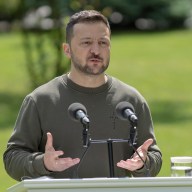ST. JOHN’S, N.L. – Newfoundland Premier Danny Williams says a former public servant made “offensive and stupid” remarks when he told a public inquiry that radio call-in shows influenced the government’s handling of an emerging scandal involving flawed breast-cancer testing.
In recent weeks, the judicial inquiry into the botched tests has put a spotlight on the tightly controlled communication strategy employed by Williams’s government.
Former deputy health minister John Abbott told the inquiry that the government’s communications staff monitored and manipulated the province’s wildly popular radio call-in shows to deliver key messages to the public on various issues, including revelations there were persistent problems with breast-cancer testing in the province dating back to 1997.
According to Abbott, the government’s strategy was a “fairly recent trend” that had a “significant impact on how government does business.”
Williams angrily denied Abbott’s testimony.
“I can tell you categorically, unequivocally, that John Abbott is completely wrong if he’s implying that government decisions are made on the basis of open-line shows,” Williams said in an interview.
“I find that offensive and stupid, quite frankly.”
Abbott left the provincial government shortly after the scope of testing errors became known in May 2007.
The inquiry is examining how 383 breast-cancer patients were given inaccurate results on their tests, and whether the province’s various health authorities responded to them and the public in an appropriate and timely manner.
Williams has denied accusations he fired Abbott, saying the former civil servant declined an offer to transfer to the Tourism Department, moving instead to the private sector.
Still, the Tory premier said he found nothing unusual about the government’s monitoring of the radio talk shows, particularly the Open Line call-in show on radio station VOCM, which is broadcast across the province.
“Governments and political parties monitor Open Line because it’s a free-wheeling, wide open medium for criticism,” he said.
For years, politicians of all stripes have been phoning in to the shows to promote funding announcements and diffuse bad press. It’s a tactic widely believed to date back to the mid-1990s, under the leadership of then premier Brian Tobin.
But critics say Williams has exhibited an unrivalled fixation with messaging and damage control, pointing to several recent instances where questions have been raised about his commitment to being open and transparent.
Last month, for example, Williams was accused of muzzling bureaucrats after his municipal affairs minister fumbled for answers when questioned about problems with fire inspections in rural areas.
Requests from journalists to interview the province’s fire commissioner, who has publicly spoken out on fire safety matters for years, were rejected by officials in the Municipal Affairs Department.
Municipal Affairs Minister Dave Denine said that was because he was the lead spokesperson on the matter.
“One of the great frustrations for reporters dealing with the current provincial government is the fact that the people who have actual expertise in issues aren’t allowed to talk to the media,” said an editorial in the St. John’s Telegram, the province’s largest daily newspaper.
“How bad can it be? How about a minister who, last fall, stopped a Telegram reporter in the middle of an interview to say, ‘That answer’s not on my sheet.”‘
Liberal house leader Kelvin Parsons said a chill permeates the provincial civil service.
“It’s almost like a fear factor,” Parsons said.
“The bureaucrats are almost afraid to speak with you or talk with you for fear of what might happen if they’re giving you some information – even if the information is what they’re required to do to help you do your job.”
Parsons said he sees parallels between Williams and Prime Minister Stephen Harper when it comes to their media strategies.
“There’s no doubt that Harper’s known to be very controlling of the message. Maybe that’s why they don’t get along.”
Williams said it’s inappropriate for civil servants to be the chief spokespeople on various issues because cabinet ministers should be held accountable for their portfolios.
“No government is perfectly transparent. It’s impossible to achieve utopia when it comes to those goals,” Williams said.
“However . . . we’ve gone certainly further than any government has gone in Newfoundland and Labrador before, and I would say we’re an example in Canada.”
Michael Temelini, a political science professor at Memorial University in St. John’s, confirmed that it’s standard parliamentary practice to have cabinet ministers serve as the sole spokesperson on matters of public importance.
Temelini said he’s more concerned about the government’s apparent aversion to debating issues in the legislature.
Newfoundland and Labrador is second only to P.E.I. in having the least-active legislature in Canada, sitting for only 34 days last year.
“This is what’s so weird about all of this: they’re more interested in the Open Line show than in the house of assembly . . . and that bothers me,” he said.
“These kinds of questions, these kinds of issues and debates need to take place in the normal, democratic institutions that we have.”
















